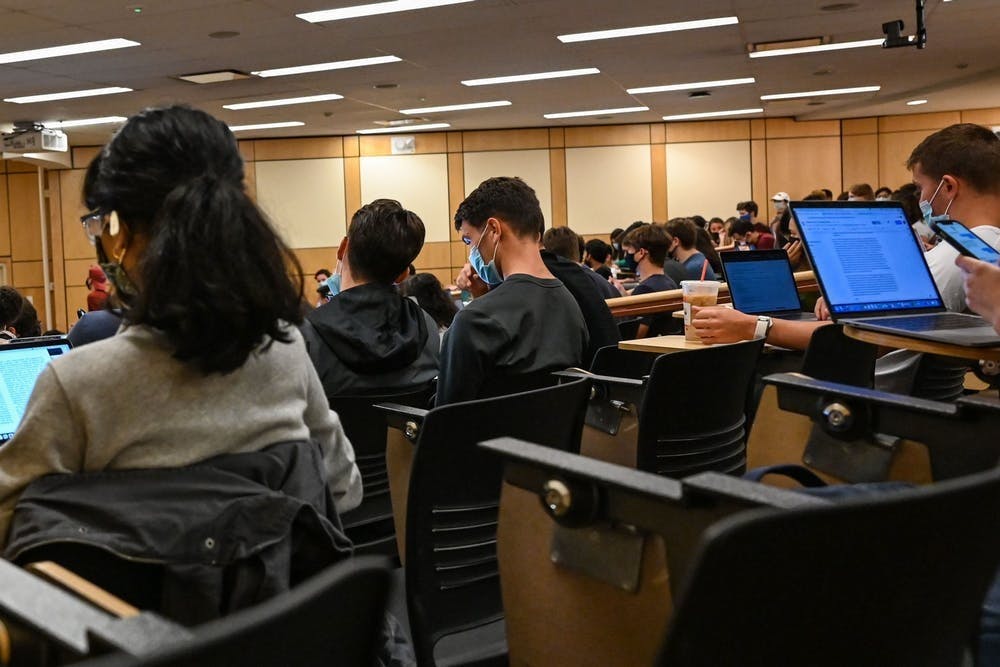
Penn’s decision to end mandatory COVID-19 testing and mask-wearing in classrooms has prompted mixed reactions from the Penn community.
In a University-wide email on Monday, Penn announced that instructors will have the option to require masking in their classrooms, which should be included on their course syllabus. The fall semester will continue Penn’s summer COVID-19 protocols that lifted mandatory testing and the universal mask mandate in classrooms. PennOpen Pass will also no longer be in use after Aug. 8.
While many community members were excited by the changes, the updated COVID-19 protocols sparked concern with other community members, particularly among students and faculty within high-risk groups. Rising College junior Ellie McKeown said that as someone highly immunocompromised and physically disabled with Ehlers-Danlos syndrome, the new policies feel like Penn is not prioritizing its disabled community member.
“My heart just sank. [Wearing masks] was kind of the last precaution I had for safety in the classroom,” McKeown told The Daily Pennsylvanian. “The attitude about whether or not disabled lives are worth living has changed, as the abled majority have decided that no, they aren’t.”
One immunocompromised and disabled professor in the College, remaining anonymous in fear of retribution from the University, told the DP that the decision to lift the universal mask mandate in classrooms not only worries them health-wise, but also financially.
“Well this is my job and I have to work to pay my bills, so I don’t really have the option to not teach in person,” the professor said. “I was relieved that I can still require masking, but a couple of [professors] were kind of pissed about [the universal mask mandate ending].”
The professor also explained how instructors are particularly susceptible to the spread of COVID-19, often teaching in the same space for multiple consecutive hours.
“Aerosols hang around in the air for like three hours, and I’ll be teaching in the same classroom for five hours, with around fifty students who are all producing aerosols the whole time,” the professor told the DP. “Asking students to wear high-quality masks is a way to guarantee some protection.”
While rising College junior CJ Composto said he was excited by Penn’s decision to end mandatory masking in classrooms, he sympathizes with those still at high risk for COVID-19.
“It’s great that the teachers and students get to decide what to do, but I also understand how people that oppose the policy may see it as unfair and are now fearing that they might get COVID-19,” Composto added.
Rising Wharton and College junior Zach Huang-Ogata also supports Penn’s COVID-19 protocols for the fall but hopes that Penn does not scale back on additional COVID-19 programs.
“[Penn] is scaling back the masks, but that doesn’t mean they should scale back their support programs that they’ve always had in place, everything from the testing, to when you test positive, and the accommodations,” Huang-Ogata told the DP.
Penn’s only testing location, at 3734 Spruce Street, will still be operational in the fall semester for “members of the Penn community who are symptomatic or have recently been exposed [to COVID-19],” Interim Provost Beth Winkelstein, Senior Executive Vice President Craig Carnaroli, and Executive Vice President for the Health System J. Larry Jameson wrote in Monday’s announcement. The testing center will also offer at-home antigen tests.
According to the Penn Cares website, the University’s public health guidelines include that “individual responsibility is key to help protect the health of the Penn campus” and that “vaccination, ventilation, cleaning and hand hygiene, and masks are always encouraged.”
Rising College junior Kevin Guo believes that Penn’s COVID-19 protocols will have greater ramifications than just people’s health.
“This current masking policy may not necessarily be the most beneficial for not just the student population, but also for the professors who need to be protected,” Guo said. “Because if a professor gets sick, then that directly affects the quality of teaching in some classes.”
Penn employees, including professors, are entitled to leave work under the Family and Medical Leave Act when they or a family member are sick.
“It’s very scary to be on FMLA because jobs are really precarious things in 2022, and you don’t want to be sick for so long that you risk losing your job, '' the anonymous College professor told the DP. “Also if you’re immunocompromised, you’re not just gonna have [COVID-19] for just a week.”
With the classroom mask mandate ending, McKeown hopes Penn will find other ways to continue to support disabled and immunocompromised students.
“Requiring professors to record their lectures and if they can’t require that, then giving [Disability Services] the power to request material for disabled students in a class would be great,” McKeown said. “Keeping the ‘Green To Go’ take-out option also helps, as I cannot eat in a mask-less dining hall whatsoever.”
McKeown also noted how some of her peers’ enthusiastic responses to the more relaxed COVID-19 protocols angered her immensely.
“I find it strange that anyone would celebrate death and injury coming to their peers just for not having to wear a simple piece of cloth over your face,” McKeown said. “Wearing a mask is so bare minimum, it’s not like we’re asking you to wear hazmat suits.”
The Daily Pennsylvanian is an independent, student-run newspaper. Please consider making a donation to support the coverage that shapes the University. Your generosity ensures a future of strong journalism at Penn.
Donate







